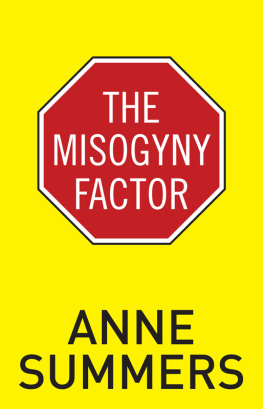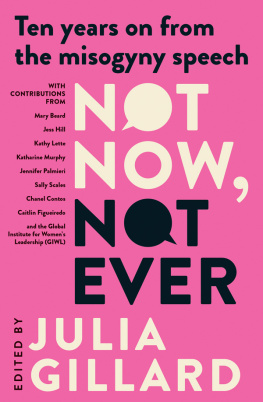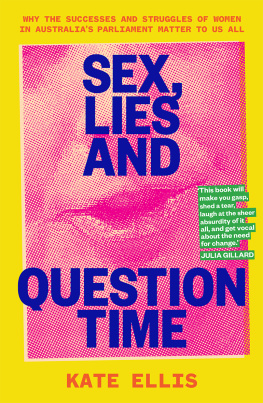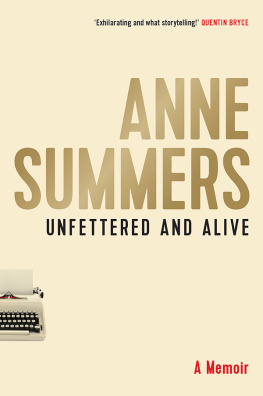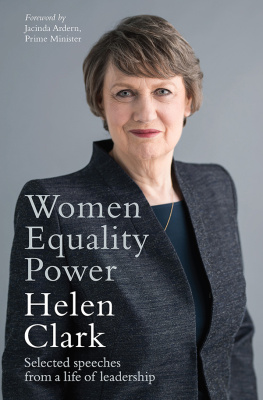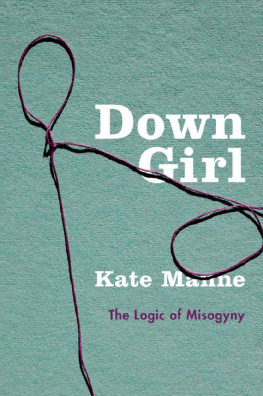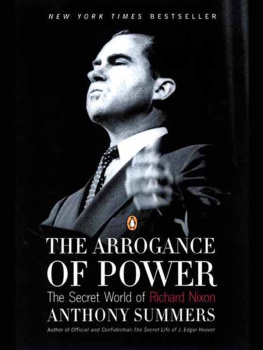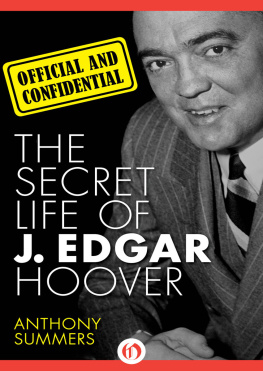THE MISOGYNY FACTOR
ANNE SUMMERS is a writer, journalist, editor of the digital magazine Anne Summers Reports and author, whose latest books are The Lost Mother and On Luck. She is author of the renowned Damned Whores and Gods Police. She writes for a number of publications including the Sydney Morning Herald, The Age and the Australian Financial Review. She has worked as a senior bureaucrat and political adviser, and is the former editor-in-chief of the landmark feminist New York based Ms. magazine. Anne has a PhD from the University of Sydney and honorary doctorates from the University of New South Wales and Flinders University. In 1989 she was made an Officer of the Order of Australia for her services to journalism and to women. In 2011 she, along with three other leading feminists, was honoured by Australia Post by having her image placed on a postage stamp.
THE MISOGYNY FACTOR
ANNE SUMMERS

A NewSouth book
Published by
NewSouth Publishing
University of New South Wales Press Ltd
University of New South Wales
Sydney NSW 2052
AUSTRALIA
newsouthpublishing.com
Anne Summers 2013
First published 2013
10 9 8 7 6 5 4 3 2 1
This book is copyright. Apart from any fair dealing for the purpose of private study, research, criticism or review, as permitted under the Copyright Act, no part may be reproduced by any process without written permission. Inquiries should be addressed to the publisher.
National Library of Australia Cataloguing-in-Publication entry
Author: Summers, Anne, 1945 author.
Title: The misogyny factor/Anne Summers.
ISBN: 9781742233840 (paperback)
ISBN: 9781742241456 (epub/mobi)
ISBN: 9781742246390 (ePDF)
Notes: Includes index.
Subjects: Misogyny Australia.
Women Political activity Australia.
Women executives Australia
Women Australia Social conditions.
Women Australia Economic conditions.
Dewey Number: 305.40994
Design Avril Makula
Cover design Sandy Cull, gogoGingko

Moll!
female interjector yelling at Prime Minister Julia Gillard from the public gallery of Parliament House during Question Time, 12 March 2013
Contents
Acknowledgments
This book initially grew out of two speeches I delivered in 2012: the Fraser Oration in Canberra in July 2012 and the University of Newcastle Human Rights and Social Justice Lecture in August 2012. I am deeply indebted to the people who invited me to give these speeches: Andrew Leigh, the federal member for Fraser in the ACT; and Kevin McConkey, Deputy Vice Chancellor (Academic and Global Relations) at the University of Newcastle. I am also grateful to Professor Louise Chappell at the University of New South Wales, and Tanja Farman and Bec Dean from Performance Space at CarriageWorks who each invited me to re-present Her Rights at Work (what is now known as The Newcastle Speech) to new audiences and thus have a further opportunity to gauge reaction to my arguments. I delivered variants on the speeches to other audiences and appreciate the opportunities to do so that were offered by Professor Caroline S. Taylor of Edith Cowan University, Laura Stokes of TEDxSouthBankWomen and the Australian Services Union National Conference.
It was Kathy Bails idea to turn the Fraser Oration into a book; I suggested she might like to consider my including the (yet-to-be-delivered) Newcastle speech as well. I thank Kathy and the rest of the team at NewSouth Publishing for their snappy work in so speedily getting this book published and known about out there in the world: Phillipa McGuinness, Heather Cam and Matt Howard.
Once I started turning the speeches into a book, I soon discovered there were many things I did not know, or needed to check, and I thank the following people who all helped me do this: Ashley Hogan, Tracy Howe and Taryn Champion from New South Wales Womens Refuge Movement, Ruth Medd from Women on Boards, Mary Ann OLoughlin, Julianne Schultz, Emma-Kate Symons, Nareen Young and Janet Wilson.
And for being there for me in all kinds of way, a big thank you to Jane Caro, Anne de Salis, Marion Hosking, Ged Kearney, Sally McManus and Jenna Price. Most of all, to Chip Rolley for his never-ending support and love.
Introduction
O nce, if a newspaper or magazine wanted to sell extra copies, it would put a banner headline What Do Women Want? on the front page. These days, the attention-grabber is Can Women Have It All?
Weve come a long way, baby.
If once we were vapid creatures who, in the view of Sigmund Freud, could not decide what we wanted, now we are voracious careerists who want the lot. That the question is even posed is, of course, gratuitous and demeaning, since the all refers to having a job and a family. If you are a bloke, you can have it all without anyone raising an eyebrow or even asking how you manage to do it all.
This was a source of particular irritation to Nicola Roxon who unexpectedly resigned as Australias first woman attorney-general in early February 2013 and who announced her intention to leave the parliament at the election to be held in September 2013 because she wants to be at home for her young daughter. She often mentioned in media interviews that it really riled her that she was constantly asked how she managed to combine being a Cabinet minister with being a wife and mother, whereas her male colleagues who were husbands and fathers were never asked the same question.
It is not just frustrating but, in fact, scandalous that the myriad assumptions and, lets face it, prejudices that lie behind this question have not really altered in more than half a century. If we didnt still think, deep down, that womens primary function is to breed and raise children, the question of all simply would not arise.
If we truly accepted the proposition that women and men are equal, and equally entitled to enjoy having a family and having a job, we wouldnt be wasting our time having this conversation.
Instead, wed perhaps be telling our kids about the bad old days before the harmonisation of work, family and school. Wed be rolling our eyes at the memory of school holidays that were out of sync with parental holidays, and at the way school finished hours before the end of the office day, leaving parents at their wits end sorting out how to cope.
Craziest of all, wed recall, was how childcare had been seemingly designed by a sadist who expected mothers yes, you wouldnt believe it, but it was the mums who had to do it back then to drop kids off on their way to work and then hightail it back through peak-hour traffic to pick them up before the centre closed. As for what it all cost, well, women would tell their incredulous offspring, I practically worked for nothing by the time I paid childcare fees.
The kids would be amazed to hear that a society that was supposed to be managed by economic rationalists had been unable to figure out that enabling women to get into the full-time workforce in the same proportions as men would increase gross domestic product by 13 per cent (and this was after all the services needed to support womens employment childcare and so on had been purchased).
Thered be other horror stories to tell, but by now the kids would be bored by accounts of the olden days when society was so, well, stupid. They take utterly for granted that both women and men can have it all, because thats the natural state of affairs, and society is organised around ensuring that it all works smoothly and equitably.
And it is precisely because we in Australia are not having this conversation that I decided to write this book. We are fumbling around the edges of the issues, tinkering with policies, doing quick fixes but never sitting back and saying:
Next page
